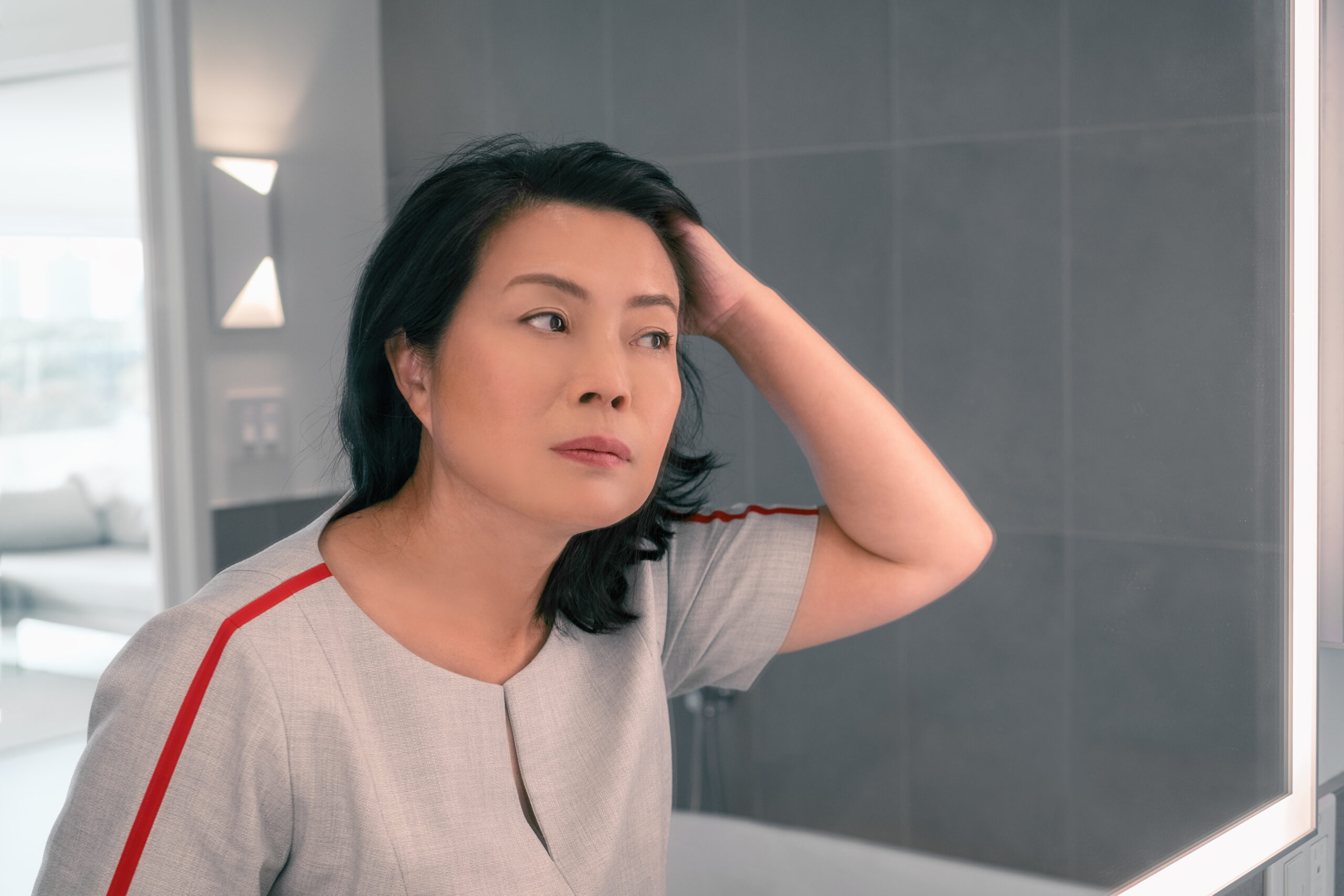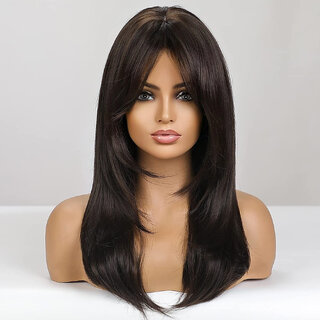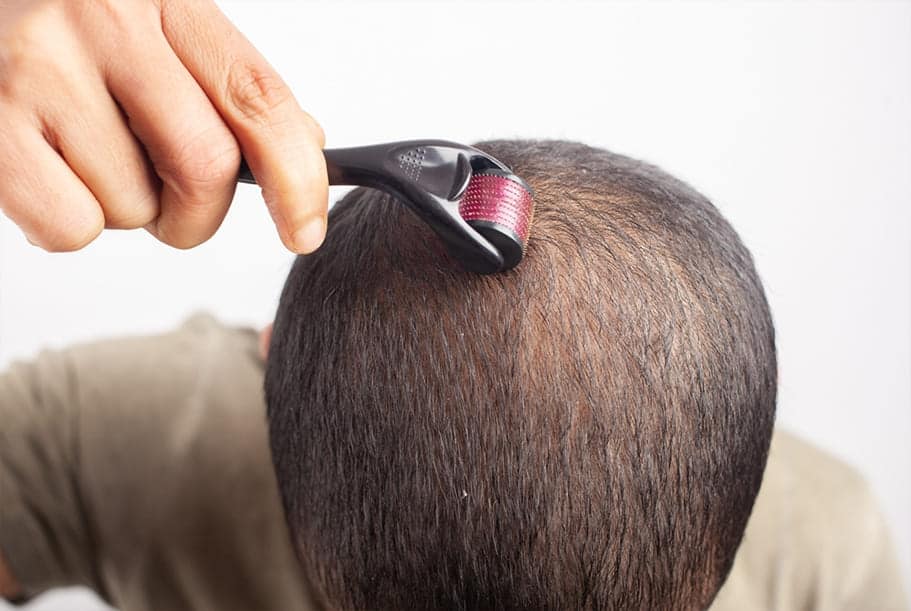Do you notice your ponytail thinning? Or finding a few too many loose hairs in the shower? Many times, women start to notice changes in their hair patterns and experience some degree of hair loss in their 50s. In your this time of your life hair loss is commonly associated with hormonal fluctuations during menopause, but bad hair-care habits and stress can also be main culprits of hair loss.
Don’t fret you’re not alone in the battle against hair loss—there are a few solutions to improve age-related hair loss. Continue reading to learn more about hair loss and discover what you can do to stimulate hair growth.
How Does Hair Grow?
Hair begins growing from a root in the bottom of the follicle. The blood vessels in your scalp feed the root, encouraging cell generation and hair growth. The hair gets pushed through the skin and passes an oil gland to make strands smooth and shiny.
More specifically, the hair growth cycle is split into four stages including the anagen phase, telogen phase, catagen phase and exogen phase. The anagen phase is the hair’s active growing stage, typically lasting about three to seven years. During the catagen, or transition, phase follicles shrink and hair growth slows down. In this phase, the hair detaches from the bottom of the hair follicle, yet stays in place for final growth to take place. In the telogen phase, hair doesn’t grow, but new hairs start to form in follicles that released hair during the previous stage. Finally, during the exogen phase, hair is shed from the scalp.
What is Hair Loss in Women?
As a natural stage of the hair growth cycle, humans shed between 50 and 100 hairs per day. Women notice hair loss when hair is lost at a higher rate than the hair grows. Signs of excessive hair loss include hair falling out in clumps, bald patches, loosening hair and gradual thinning. Roughly more than 50% of women experience noticeable hair loss in their lifetimes. The medical term for hair loss in women is “androgenic alopecia.”
What Causes Hair Loss?
Here are a few reasons why women may experience hair loss in their 50s:
Genetics
The most common explanation for hair loss in women is genetics. Hair loss genes can be inherited by either of your parents. Heredity hair loss often shows itself through a widening part or a receding hairline.
Menopausal Hormone Fluctuations
Typically, menopause happens around ages 49 to 51. During menopause, estrogen levels, a hormone that supports healthy hair growth, drop, giving rise to testosterone. Testosterone converts to dihydrotestosterone (DHT), a hormone that shrinks hair follicles, resulting in thinner hair and slower hair growth. Another culprit of hair loss during menopause is inflammation. Hair follicle inflammation occurs when the hair follicle becomes inflamed, which can destroy hair follicles and leave scarring near the hairline.
Stress
When it comes to hair loss, don’t overlook the negative impacts of stress. Life events like the loss of a loved one or a marriage separation can trigger extreme stress. Increased levels of stress push your body into ‘survival mode,’ which causes it to focus solely on its vital functions—the hair not being one of these. As mentioned above, the hair has both growth and resting phases. When the body is under stress, your body shortens the growth phase by pushing hairs into the resting phase. You will typically notice hair shedding three months after the stressful event and it can last for up to six months. The good news is that stress-induced hair loss often grows back with time.
Pro Tip: To relieve stress, treat yourself to a relaxing scalp massage to ease muscle tension and improve blood flow to your scalp, supporting hair growth.
Poor Diet Habits
Crash dieting and unhealthy eating habits can contribute to hair loss. Your body registers unhealthy weight loss as a stressful event, which sends your body into survival mode. Additionally, an imbalanced or unhealthy diet usually means your hair isn’t getting the nutrients and minerals it needs to support healthy growth. A protein or vitamin deficiency may affect how your hair grows and make it dry, dull and more vulnerable to damage. To avoid diet-related hair loss, be sure to eat a nutritional diet rich in protein and supplemented with vitamins A, B, C, D and E and iron, zinc and omega-3 fatty acids. Consider taking a daily supplement, like the one from Better Not Younger, to consume the necessary vitamins for healthy hair.
Bad Hair-Care Habits
Traumatic hair-care habits from your 20s may catch up to you in your 50s. Hot tools, like straighteners and curlers and tight hairstyles put pressure on the roots, which can damage hair follicles and lead to scarring. Try to give hot tools a break, loosen hairstyles around the hairline and use chemical-free hair products to avoid unnecessary breakage and hair loss.
Conclusion
It’s important to understand why hair loss is happening in order to find solutions that help strengthen your tresses and boost hair growth. Genetics, hormone fluctuations, stress, an imbalanced diet and bad hair-care habits contribute to hair loss. From giving yourself a relaxing scalp massage to prioritizing a healthy diet and a gentle hair-care routine, you can minimize hair loss in the next years to come.





